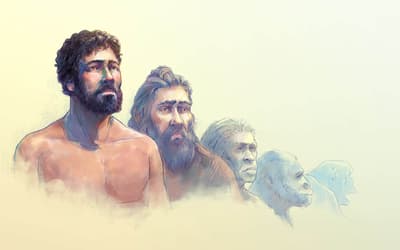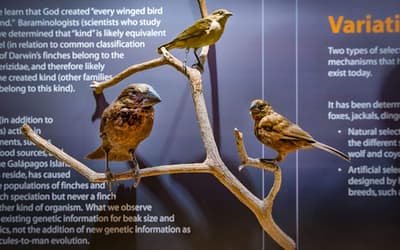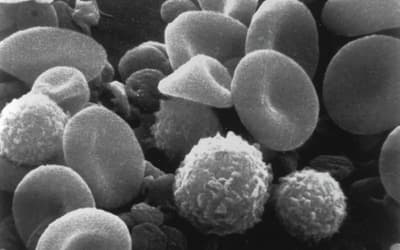The views expressed in this paper are those of the writer(s) and are not necessarily those of the ARJ Editor or Answers in Genesis.
Abstract
Critics of creationism have attempted to negate the effect of a widely quoted admission that evolution is accepted, not because it has been documented to occur, but because the only alternative, special creation, is unacceptable to evolutionists. One claim is the author of this statement was an obscure professor, thus the quote carries little weight. Another claim is creationists have misquoted him. Both of these allegations were found to be false.
Keywords: D.M.S. Watson, creationism, evolution, misquoting, prominent creationists, creation-evolution controversy, history of the creation movement.
Introduction
One of the most widely used quotes by creationists is by paleontologist David Meredith Seares Watson (1886–1973). The quote is as follows:
Evolution itself is accepted by zoologists not because it has been observed to occur or . . . can be proved by logically coherent arguments to be true, but because the only alternative, special creation, is clearly incredible (Watson 1929a, 233).
As Wikipedia correctly observed, “This quotation of Watson is often used in Creationist writings in an attempt to show that Watson, and thus by extension promoters of evolution in general, dismiss creationism due to anti-theistic bias” (2021). Use of the Watson quote is also often claimed by evolutionists to be an example of both quote mining and misquoting by creationists (The Quote Mine Project 2003–2004). A review of the 2006 book Intelligent Design vs. Evolution: Letters to an Atheist by Ray Comfort mentions that the book includes “creationists’ usual misquotations from scientists: out of context and outdated with generous use of ellipses. An excellent example is a 1929 quote from D. M. S. Watson.” (Sager 2006). The article’s author, Carrie Sager, then repeated the Watson quote cited above. A few other examples of creationists’ use of the Watson quote include Henry M. Morris (1985, 8), Duane Gish (1995, 15–16), and Philip Vander Elst (2003; 2005, 54). Dr. D. James Kennedy in his book Why I Believe (1999) wrote:
Professor D. M. S. Watson was a famous evolutionist [who] made the remarkable observation that evolution itself is a theory universally accepted, “not because it has been observed to occur or can be proved by logically coherent evidence to be true, but because the only alternative—special creation—is clearly incredible”. (Kennedy 1999, 47)
In an effort to refute the impact of this quote, the editor of the website Infidels.org, who maintains he has 260,000 visitors a month, claimed that Watson was an “obscure professor” and
famous evolutionists would include people like Darwin, Huxley, Gould, Eldredge, Mayr, Simpson, Johanson, Leakey, Sagan, and Asimov, but not . . . . D. M. S. Watson. The fact that Kennedy picked these obscure authors reveals that he either knows nothing at all about the subject or that he deliberately misrepresents it. (Augustine 2021)
But was D. M. S. Watson really an “obscure professor”?
Background of D. M. S. Watson
David Meredith Seares Watson (1886–1973) was the Jodrell Professor of Zoology and Comparative Anatomy at University College, London, from 1921 to 1951 (Lewis 1967, 85). He was not a neophyte evolutionist, but had a wide interest and a deep knowledge of fossils which he studied extensively in both the British Museum of Natural History in London, and on extended research visits to South Africa, Australia, and the United States.
His many awards and academic honors include the Darwin Medal from the Royal Society, the prestigious Linnean Medal from the Linnaean Society, the Wollaston Medal from the Geological Society of London, and honorary degrees from numerous universities. Watson amassed a large collection of fossils, focusing on vertebrate paleontology, especially fossil reptiles. His acknowledged expertise earned him the position as curator of what is now the Grant Museum of Zoology at University College London in the UK (Parrington and Westoll 1974). He authored a leading textbook titled Paleontology and Modern Biology (Watson 1951). Given his background, what Watson wrote is very significant. He was not by any means an “obscure professor.”
Other Putative Examples of the Watson Misquote
Others who quoted Watson include a minister who wrote that humanists seek to get rid of God by using so-called scientific arguments against His existence, such as evolution, which is
not very scientific . . . . noted scientist, Professor D. M. S Watson, is, when he says: “Evolution itself is accepted by zoologists, not because it has been observed to occur, or . . . . can be proved by logically coherent evidence to be true, but because the only alternative, special creation, is clearly incredible”. (Philip 2014)
In response to this reference, Professor Paul S. Braterman, M.A., D.Phil., D.Sc. writes: “I will be charitable, and assume that you are unaware of the fact that you are echoing a well-known misrepresentation of Watson’s position.”(Braterman 2014). Professor Braterman opines that this is a well-known misrepresentation because, in his presidential address, Watson wrote:
Evolution itself is accepted by zoologists not because it has been observed to occur or is supported by logically coherent arguments, but because it does fit all the facts of Taxonomy, of Palaeontology, and of Geographical Distribution, and because no alternative explanation is credible. (Watson 1929b; emphasis added)
But is Professor Braterman’s claim of misrepresentation accurate? Certainly, Watson believed in evolution and his 1929 view is clear. The alternative explanation (i.e., God), he avers, is not credible. But the main evidence for evolution touted for decades, including vestigial organs (Bergman 2019), homology, the notion that ontogeny recapitulates phylogeny called the biogenic law (Bergman 2011), have all been disproved, both then and more so today (Bergman 2019). The evidence for human evolution has been disproven: Piltdown Man was a fraud; Nebraska Man was a pig; Peking Man, Neanderthal Man, and Java Man were human (Bergman 2017). Australopithecines and other “missing links” were either fully ape or people groups claimed to be less-evolved races such as Neanderthal Man (Bergman 2020; Lubenow 2018; Menton 2013; Mortenson 2016, 263–286). Furthermore, by assuming that Darwinian evolution fits “all the facts of Taxonomy, of Palaeontology, and of Geographical Distribution,” Watson states that they fit even the now discredited Lamarckian theory, as noted below. Lamarckian theory maintains that acquired or learned traits can be passed on from parents to offspring. Life forms lose traits they do not require (or use) and develop characteristics that are beneficial during their lifetime. In addition, Watson also incorrectly claimed “the fact of evolution is accepted by every biologist,” a claim that ignores the many scientists who do not accept microbe-to-microbiologist evolution, both then and also today.1, 2 Aside from these shortcomings, Watson was accurate about his claim that evolution is accepted by zoologists not because it can be proved but because special creation is incredible. After admitting that many major weaknesses exist in Darwinian evolution and incorrectly claiming “the fact of evolution is accepted by every biologist,” Watson correctly states,
the mode in which it has occurred and the mechanism by which it has been brought about are still disputable. The only two ‘theories of Evolution’ which have gained any general currency, those of Lamarck and of Darwin, rest on a most insecure basis; the validity of the assumptions on which they rest has seldom been seriously examined, and they do not interest most of the younger zoologists . . . . (Watson 1929a, 231)
In detailing the problem that evolution is accepted in spite of its “insecure basis” of support, and the cause of evolution is disputable, Watson concluded that
the present position of zoology is unsatisfactory. We know as surely as we ever shall that evolution has occurred; but we do not know how this evolution has been brought about. The data which we have accumulated are inadequate, not in quantity but in their character, to allow us to determine which, if any, of the proposed explanations is a vera causa. (Watson 1929a, 234)
Watson also admitted that the:
extraordinary lack of evidence to show that the incidence of death under natural conditions is controlled by small differences of the kind which separate species from one another or, what is the same thing from an observational point of view, by physiological differences correlated with such structural features, renders it difficult to appeal to natural selection as the main or indeed an important factor in bringing about the evolutionary changes which we know to have occurred.
It may be important, it may indeed be the principle which overrides all others; but at present its real existence as a phenomenon rests on an extremely slender basis. The extreme difficulty of obtaining the necessary data for any quantitative estimation of the efficiency of natural selection makes it seem probable that this theory will be re-established, if it be so, by the collapse of alternative explanations which are more easily attacked by observation and experiment.
He then added his famous quote:
If so, it will present a parallel to the Theory of Evolution itself, a theory universally accepted, not because it can be proved by logically coherent evidence to be true, but because the only alternative, special creation [the doctrine that the universe and all life in it originated by divine decree], is clearly incredible. (Watson 1929a, 233)
In response to Watson, a leading twentieth century biology professor and one of the founders of Neo-Darwinism, J. T. Cunningham, agreed:
Notwithstanding all of the discussion that has taken place since 1859 concerning evolution, adaptation, and selection, biologists are still far from agreement, not merely concerning the explanations that have been proposed, but also concerning the things to be explained [by evolution]. (Cunningham 1929, 617; emphasis added)
Cunningham added that Watson, in his presidential address to the annual meeting of British Association for the Advancement of Science, mentioned that “structural adaptation may be in many cases imaginary, or may have been the cause of habit, not the consequence” of natural selection (Cunningham 1929, 617). One of the most prominent evolutionists of the last century, J. B. S. Haldane (1892–1964), added that “quantitative work shows clearly that natural selection is a reality, and that, among other things, it selects Mendelian genes, which are known to be distributed at random through wild populations, and to follow the laws of chance in their distribution to offspring. In other words, they are an agency producing variation of the kind which Darwin postulated as the raw material on which selection acts.” (Haldane 1929, 444: emphasis added). This explanation of how evolution could work is both seriously and logically incorrect (Bergman 2021).
C. S. Lewis Agrees with Watson and Explains Why
C. S. Lewis agreed with Professor D. M. S. Watson’s assertion that evolution is universally accepted, not because it can be proved but because the alternative, special creation, is clearly incredible (Lewis 1967, 85).3 Quoting Watson’s claim at least twice, Lewis realized that this “would mean that the sole ground for believing it [evolution] is not empirical but metaphysical—the dogma of an amateur metaphysician who finds ‘special creation’ incredible.” (Lewis 1967, 85).
Lewis elsewhere asked himself, “Does the whole vast structure of modern [evolutionary] naturalism depend not on positive evidence but simply on an a priori metaphysical prejudice? Was it [evolution] devised not to get in facts but to keep out God?” (Lewis 1949, 136). Lewis answered this question in detail in his writings, concluding that the statement by Professor Watson clearly was correct.
Summary
D. M. S. Watson believed in the evolution of all life (i.e., microbe-to-microbiologist evolution, aka macro-evolution), and clearly out-of-hand rejected any form of intelligent causation. He also openly admitted that the evidence for macro-evolution was severely problematic, which is why, for good reasons, creationists—who happen to agree— have been quoting him for decades. The testimony of a hostile witness is indeed powerful.
Watson’s claims that “the fact of evolution is accepted by every biologist” and Darwinian evolution fits “all the facts of Taxonomy, of Palaeontology, and of Geographical Distribution” are clearly incorrect and thus for good reason are ignored by creationists who quote Watson. Including them adversely affects the veracity of Watson’s accurate observations about why evolution is accepted. Even if creationists included and refuted these sections of the Watson quote, doing so would move into tangents away from the point Watson accurately made, namely that severe scientific problems exist with (and within) the theory of evolution.
References
Augustine, Keith. 2021. “Why I Believe in Creation.” https://infidels.org/library/modern/anachronist/why_i_believe/4_cretin.html.
Bergman, Jerry. 2011. “The Rise and Fall of Haeckel’s Biogenetic Law.” In Sacred Cows in Science: No Objectivity Allowed, edited by E. Norbert Smith, 31–50. Scotts Valley, California: CreateSpace Publishing.
Bergman, Jerry. 2017. Evolution’s Blunders, Frauds and Forgeries. Atlanta, Georgia: CMI Publishing.
Bergman, Jerry. 2019. Useless Organs: The Rise and Fall of the Once Major Argument for Evolution. Tulsa, Oklahoma: Bartlett Publishing.
Bergman, Jerry, Peter Line, and Jeffrey Tomkins. 2020. Apes as Ancestors: Examining the Claims About Human Evolution. Tulsa, Oklahoma: Bartlett Publishing.
Bergman, Jerry. 2021. “The History of Using Radiation to Speed up Evolution.” Answers Research Journal 14 (March 24): 61–66. https://answersresearchjournal.org/history-using-radiation-evolution/.
Braterman, Paul S. 2014. “Creationism and Evolution: An Open Letter to a Misleadingly Quote-mining Minister.” Primate’s Progress, March 1. https://paulbraterman.wordpress.com/2014/03/01/creationism-and-evolution-an-open-letter-to-a-misleadingly-quote-mining-minister/.
Cunningham, J. T. 1929. Adaptation. Nature 124, no. 3128 (October 19): 617.
Elst, Philip Vander. 2003. “Is There No God?” BeThinking. https://www.bethinking.org/does-god-exist/is-there-no-god.
Elst, Philip Vander. 2005. C. S. Lewis: A Short Introduction. London, United Kingdom: Bloomsbury Academic.
Gish, Duane. 1995. Evolution? The Fossils Still Say No! El Cajon, California: Institute for Creation Research.
Haldane, J. B. S. 1929. “Natural Selection.” Nature 124, no. 3125 (September 21): 444.
Kennedy, D. James. 1999. Why I Believe. Nashville, Tennessee: Thomas Nelson Publishers.
Lewis, C. S. 1949. The Weight of Glory and Other Addresses. New York, New York: HarperCollins.
Lewis, C.S. 1967. Christian Reflections. Edited by Walter Hooper. Grand Rapids, Michigan: W. B. Eerdmans.
Lubenow, Marvin. 2018. “Neanderthals: Our Worthy Ancestors.” https://answersingenesis.org/human-evolution/neanderthal/our-worthy-ancestors/.
Menton, David. 2013. “Did Humans Really Evolve from Ape-like Creatures?” https://answersingenesis.org/human-evolution/ape-man/did-humans-really-evolve-from-apelike-creatures/.
Morris, Henry M., ed. 1985. Scientific Creationism. El Cajon, California: Master Books.
Mortenson, Terry. 2016. Searching for Adam: Genesis & the Truth About Man’s Origin. Green Forest, Arizona: Master Books.
Parrington, Francis Rex, and Thomas Stanley Westoll, 1974. “David Meredith Seares Watson, 1886–1973.” Biographical Memoirs of Fellows of the Royal Society 20 (December): 482–504.
Philip, William J. U. 2014. “The Inhumanity of Humanism.” The TRON Church, February 24. http://www.thetron.org/2014/02/the-inhumanity-of-humanism/.
The Quote Mine Project. 2003–2004. “Miscellaneous”—Quote #80. Talk Origins. http://www.talkorigins.org/faqs/quotes/mine/part1-4.html#quote80.
Sager, Carrie. 2006. “Intelligent Design vs. Evolution.” Reports of the National Center for Science Education 26, no. 6 (November–December): 28–29.
Watson, D. M. S. 1929a. “Adaptation.” Nature 124, no. 3119 (August 10): 231–234.
Watson, D. M. S. 1929b. Report of the Ninety-Seventh Meeting of the British Association for the Advancement of Science, 88.
Watson, D. M. S. 1951. Paleontology and Modern Biology. New Haven, Connecticut: Yale University Press.
Wikipedia. 2021. D. M. S. Watson. https://en.wikipedia.org/wiki/D._M._S._Watson.












